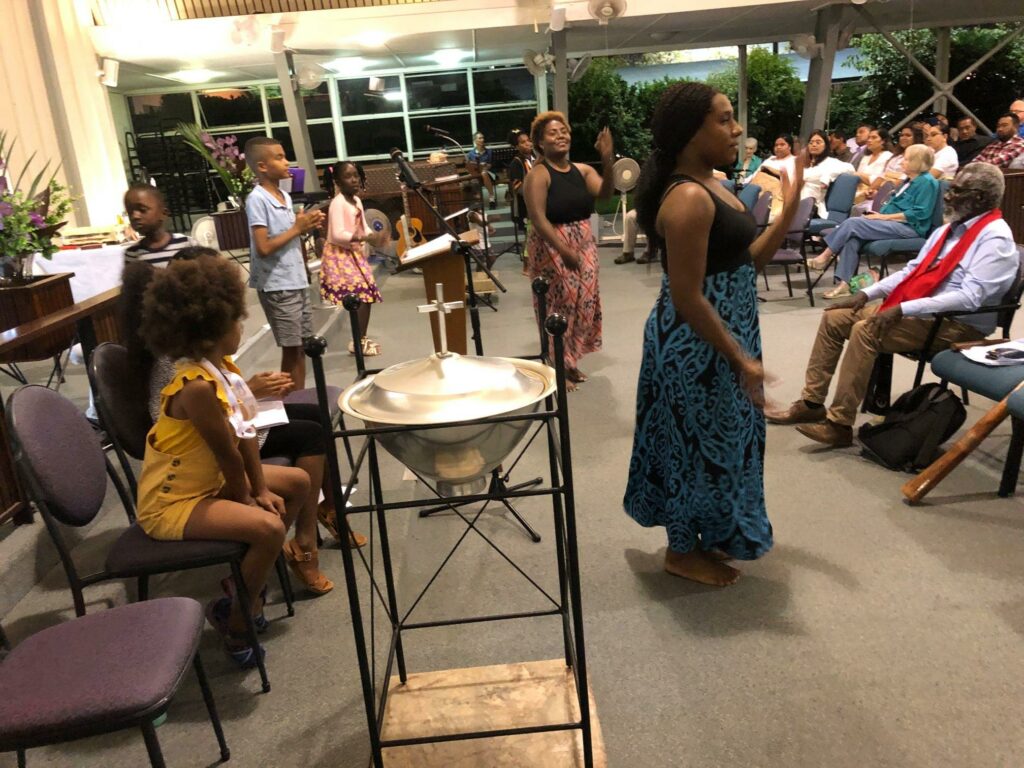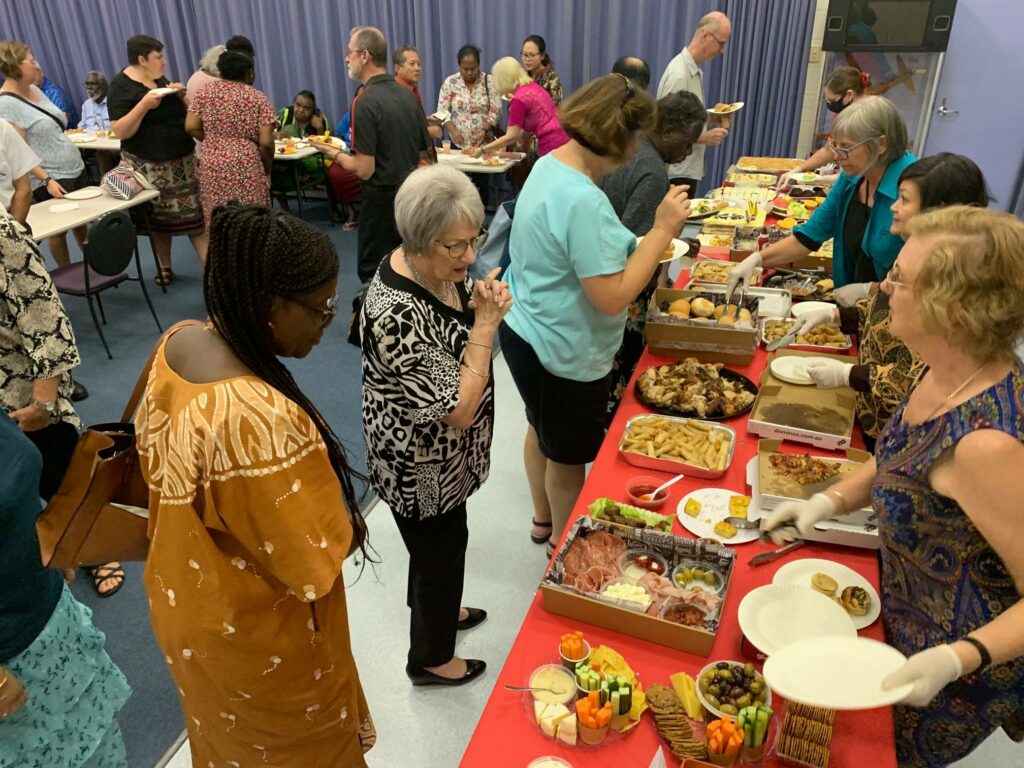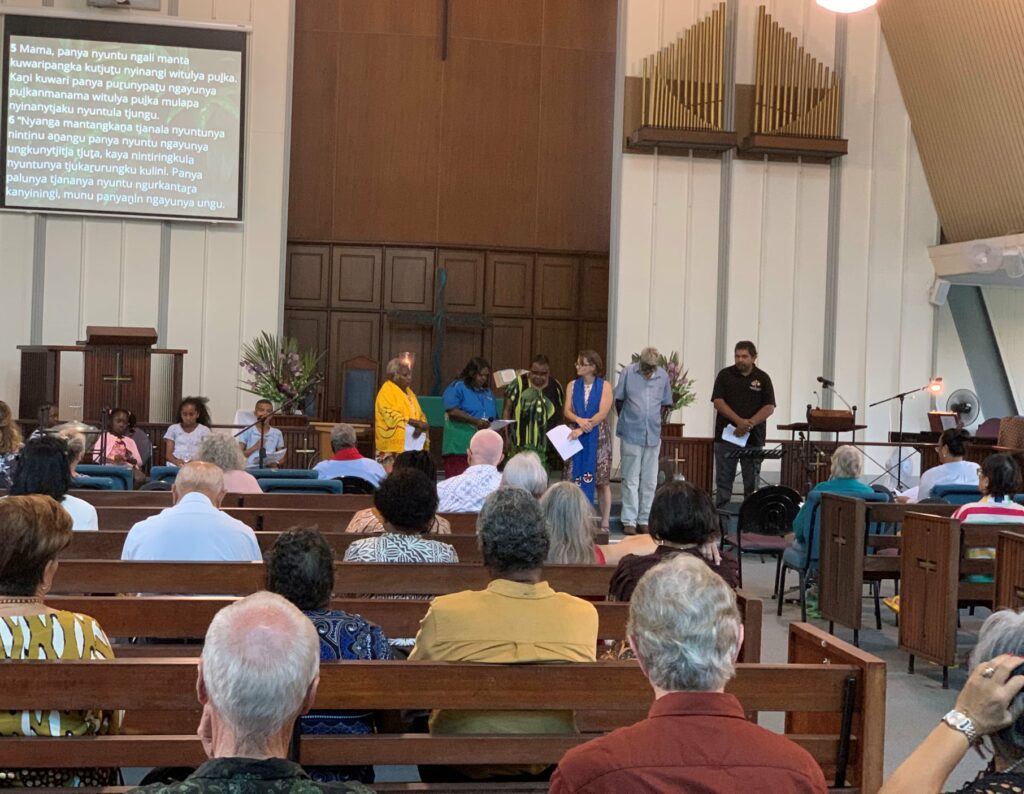Worshipping in an Intercultural Church
As we continue to explore our calling to be an Intercultural Church, we consider what it means to worship together in a way that is inclusive and celebrates the rich cultural diversity of our Church.
On any Sunday in the Uniting Church, worship is shared in more than 45 languages, including languages of First Peoples. Cultural traditions and dress are a key feature in many of our worshipping communities.
But our calling to be an intercultural church calls us to go further – to be intentional about crossing our cultural boundaries to learn from and by enriched by one another.
In the 2013 Assembly Resource Guidelines for Culturally Inclusive Worship, those involved in planning for worship are asked to think not only about how we might include a song from a particular cultural community or a Bible reading in language but how all the components of worship are decided by a culturally diverse worship team.
“Blending traditions well takes creativity. It is best done through face to face meetings where listening and trust are practiced.”
In 2020 Rev Radhika Sukumar-White from the Transforming Worship Circle and Leichardt Uniting Church authored a paper Towards intentionally anti-racist worship encouraging UCA to re-think how we do worship in a way that actively confronts racial inequities. She provided a list of ideas and steps people could take.
Below are some examples of ways UCA communities participate in intercultural worship. We know there are many more and we would love you to share them with us.
Sydenham-Caroline Springs Uniting Church – All have a place
Sydenham-Caroline Springs congregation in the western suburbs of Melbourne is a living example of our Intercultural Church. On any given Sunday people from eight different cultures gather together.
Reflecting the rich cultural diversity of the wider region, the worshipping community of 40-50 people includes members from the Philippines, India, Kenya, Canada and Tonga, as well as England and Australia.
“The congregation is a vibrant and welcoming community, with a growing intercultural and intergenerational ministry based on a strong sense of acceptance and belonging,” says Rev Feke Kamitoni, who has been Minister for the congregation since early 2017.
On the Sydenham-Caroline Springs Uniting Church website, they proudly celebrate this diversity: “as a multicultural church we celebrate God’s gift of diversity and the invitation to be one in Christ. All people are valued for who they are … all have a place in our community of faith.”
The commitment to inclusion and to living life together can be seen in regular opportunities for fellowship beyond Sunday worship, as members share across cultures in family camps, meals, and in ministry in the community. The congregation also has a strong intergenerational make-up, with 25% of its members under the age of 29. Two young adults sit on the church council and its programs for youth and children are led by its youth.
Eastwood Uniting Church - Second Peoples worshipping on Wallamattegal Country
By Rev Dr Amelia Koh Butler
Eastwood Uniting Church commences worship each week with a greeting in Darug language. Warami mittigar means ‘you are welcome here’. Then we greet one another in our various migrant languages: English, Mandarin, Cantonese and Korean. Ours is a mixed Second Peoples congregation and we are learning together about what it means to be a mixed Second Peoples family on Wallamattegal country. Recently, we sold a property and we are glad to be able to give back some of the proceeds to support the healing work of Uniting Aboriginal and Islander Christian Congress (UAICC) and become more active in our commitment to covenanting with First Peoples. At a recent Chinese-language Baptism, a Thursday Island Pastor turned up and offered a blessing. It was a great sign for our Chinese members that God moves in the relationships between First and Second Peoples. On Sunday 4 July Eastwood Uniting Church is hosting a NAIDOC Week service at 10.30am in four languages. If you would like to experience an Intercultural Worship service, then join via Zoom: https://uca-nswact.zoom.us/j/5450786355
Anaditj (Adnyamathanha language) - always was, always will be!
Darwin Uniting Church Birthday Multicultural Celebration
On Sunday 20 June, Darwin Memorial Uniting Church hosted a special 44th UCA Anniversary multicultural service and celebration prepared by Rev Dr Katalina Tahaafe-Williams. Guest Preacher was Rev Maratja Dhamarrandji from East Arnhem Ministry of the Northern Regional Council of Congress. The service included bible readings by students of Nungalinya College and Tongan dancing, including to a South African song (WATCH the video). The service was livestreamed but for those who could gather in person the fellowship continued with a shared meal after the worship. Katalina said she hope the multicultural celebration would get bigger each year. Previously she was involved in organising a large-scale Multicultural Festival in the NSW/ACT Synod that brought people together in worship, with food stalls, games, creative dance and music throughout a whole weekend marking the UCA Anniversary.
Photos: Rev Dr Katalina Tahaafe-Williams.
First Steps to an Intercultural Church
By Rev Lindsay Cullen, Assembly National Consultant
One question I find many UCA communities struggle with is how to move beyond being a Church which has welcomed many congregations of different languages and cultures to be part of our family, and toward being a Church where our own congregations reflect our vibrant and diverse Australian society. One out of every two Australians was either born or has a parent that was born overseas. Many people find it hard to imagine what the Church would look like, if it truly reflected and indeed celebrated that reality, demonstrating in microcosm the New Testament picture of the “vast crowd, too great to count, from every nation and tribe and people and language, standing in front of the throne and before the Lamb.” (Rev 7:9, NLT) I find it hard to imagine too!
So, what are the first steps that take us a little further along the way to that fabulous vision?
It might be as simple as a verbal acknowledgement in Church gatherings that we seek to be an intercultural and anti-racist Church. At Leichardt Uniting Church in Sydney, we make a statement like this as part of the standard liturgy as well as our Acknowledgement of Country. When I visited the Uniting Church in Gungahlin in the ACT, the opening slides shown on the big screen displayed a picture of the flags representing countries from which members and attendees had come, and the congregation was encouraged to let the Minister know if there were flags that needed to be added. As happens in other places I have visited too, those who took part in Bible Readings or Prayers were invited to share these in their ‘heart language’.
These are simple steps, yes, but they are first steps towards the desired goal. I encourage every Church Council to think, “What are one or two things we can institute that will help us move toward being a genuinely intercultural Church?” And once those things have become part of your practice, then ask “What’s the next step?” And if you find yourself thinking that you haven’t got a clue what practices of your congregation might need to change, then perhaps the first step is to ask someone with a background different to your own!









